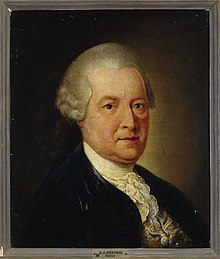Karl Christian Gärtner
Karl Christian Gärtner (born November 24, 1712 in Freiberg ; † February 14, 1791 in Braunschweig ) was a German writer and university professor.
Life
Founder of the Bremen Posts
Gärtner attended the Princely School in Meissen , where he met CF Gellert , GW Rabener and JA Cramer . He later met Gellert and Rabener again in Leipzig, who, like himself, initially joined JC Gottsched . Gärtner gave the impetus to found the literary journal of the New Contributions to the Pleasure of Understanding and Joke , a group of writers who rebelled against the strict rules that Gottsched had set for “good literature”.
Cramer, JA Schlegel and Rabener, then also Ebert , Konrad Arnold Schmid , Zachariae , Giseke and, above all, their most famous Klopstock , who published his first songs of the Messiah in the Bremen contributions, took part in these Bremen contributions . Gärtner earned his reputation for his shepherd's game Die tested Treue , with which he opened the first issue of the magazine. His work, however, was mainly in the editorial area, checking and viewing the submitted work.
Professor in Braunschweig
Gärtner left Leipzig in 1745 and came to Braunschweig as court master of the two Counts of Schönburg . At the suggestion of JFW Jerusalem , he first became a lecturer at the Collegium Carolinum there . In 1748 he received a professorship for oratory and ethics. In his courses on ethics, he oriented himself on Gellert's moral lectures . On the basis of Gottsched's outline for a sensible rhetoric , he had his students work out essays and organized rhetorical exercises. Gottsched's critical poetry served as a guideline for his poetics lectures.
In 1761 he published the collection of some speeches that he had prepared for students of the Carolinum for lectures on solemn occasions. He remained in friendly contact with the other members of the Leipziger Kreis who were employed in Braunschweig. Together with Zachariae he undertook a translation of Linguets Theater espagnol (Braunschweig 1770–1771, 3 volumes). In 1775 he became canon of the Blasius pen . In 1780 he was appointed Hofrat by his former student, Duke Karl Wilhelm Ferdinand . Gärtner died in Braunschweig in 1791.
Literary effect
Gärtner was valued by his contemporaries for his literary judgment and rhetorical skills. From today's perspective, it is stated that the peculiarity of his form of literary criticism compared to that of Gottsched is difficult to reconstruct due to the lack of appropriate sources. His collection of some speeches was praised at the time; however, the speeches were written in a more traditional way and based on typical panegyric patterns .
Ultimately, Gärtner's literary historical significance is based primarily on his work as the editor of the Bremen contributions . He acted as a mediator of the aesthetics of language and the sense of style of his time.
literature
- Barbara Bauer: gardener, Carl Christian. In: Walther Killy (Ed.): Literaturlexikon. Authors and works of German language. Bertelsmann-Lexikon-Verlag, Gütersloh, Munich 1992, Volume 4, p. 72 f.
- Isa Schikorsky: gardener, Karl Christian. In: Horst-Rüdiger Jarck , Dieter Lent et al. (Ed.): Braunschweigisches Biographisches Lexikon - 8th to 18th century . Appelhans Verlag, Braunschweig 2006, ISBN 3-937664-46-7 , p. 246-247 .
- Wilhelm Creizenach : gardener, Karl Christian . In: Allgemeine Deutsche Biographie (ADB). Volume 8, Duncker & Humblot, Leipzig 1878, p. 381 f.
- Fritz Meyen : gardener, Karl Christian. In: New German Biography (NDB). Volume 6, Duncker & Humblot, Berlin 1964, ISBN 3-428-00187-7 , p. 25 f. ( Digitized version ).
- Fritz Meyen: Bremen contributor to the Collegium Carolinum in Braunschweig. K. Chr. Gärtner, JA Ebert, FW Zachariä, KA Schmid. Orphanage Buchdr. und Verl., Braunschweig 1962 (= Braunschweiger Werkstücke. 26).
Web links
- Literature by and about Karl Christian Gärtner in the catalog of the German National Library
- Gottfried Wilhelm Leibniz Library : Database of People from Lower Saxony (Search field Name: Gärtner, Karl Christian)
Individual evidence
- ^ A b c Barbara Bauer: Gardener, Carl Christian. In: Walther Killy (Ed.): Literaturlexikon. Authors and works of German language. Bertelsmann-Lexikon-Verlag, Gütersloh, Munich 1992, Volume 4, p. 73.
- ^ Isa Schikorsky: Gärtner, Karl Christian. In: Horst-Rüdiger Jarck , Dieter Lent et al. (Ed.): Braunschweigisches Biographisches Lexikon - 8th to 18th century . Appelhans Verlag, Braunschweig 2006, ISBN 3-937664-46-7 , p. 247 .
- ^ Fritz Meyen: Gärtner, Karl Christian. In: New German Biography (NDB). Volume 6, Duncker & Humblot, Berlin 1964, ISBN 3-428-00187-7 , p. 25 f. ( Digitized version ).
| personal data | |
|---|---|
| SURNAME | Gardener, Karl Christian |
| ALTERNATIVE NAMES | Gardener, Carl Christian; Gardener, CC |
| BRIEF DESCRIPTION | German writer |
| DATE OF BIRTH | November 24, 1712 |
| PLACE OF BIRTH | Freiberg |
| DATE OF DEATH | February 14, 1791 |
| Place of death | Braunschweig |
